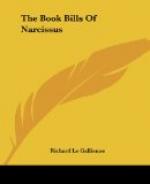Whether it was as apparent on the due date, or whether of that ten pounds I have ever looked upon the like again, is surely no affair of the Reader’s; but, lest he should do my friend an injustice, I had better say—I haven’t.
CHAPTER IV
ACCOUNTS RENDERED
Nothing strikes one more in looking back, either on our own lives or on those of others, than how little we assimilate from the greatest experiences; in nothing is Nature’s apparent wastefulness of means more ironically impressive. A great love comes and sets one’s whole being singing like a harp, fills high heaven with rainbows, and makes our dingy alleys for awhile bright as the streets of the New Jerusalem; and yet, if five years after we seek for what its incandescence has left us, we find, maybe, a newly helpful epithet, maybe a fancy, at most a sonnet. Nothing strikes one more, unless, perhaps, the obverse, when we see some trifling pebble-cast ripple into eternity, some fateful second prolific as the fly aphis. And so I find it all again exampled in these old accounts. The books that mean most for Narcissus to-day could be carried in the hand without a strap, and could probably be bought for a sovereign. The rest have survived as a quaint cadence in his style, have left clinging about his thought a delicate incense of mysticism, or are bound up in the retrospective tenderness of boyish loves long since gone to dream.
Another observation in the same line of reflection also must often strike one:—for what very different qualities than those for which we were first passionate do we come afterwards to value our old enthusiasms. In the day of their bloom it was the thing itself, the craze, the study, for its own sake; now it is the discipline, or any broad human culture, in which they may have been influential. The boy chases the butterfly, and thinks not of the wood and the blue heaven; but those only does the man remember, for the mark of their beauty upon him, so unconsciously impressed, for the health of their power and sweetness still living in his blood—for these does that chase seem alone of worth, when the dusty entomological relic thereof is in limbo. And so that long and costly shelf, groaning beneath the weight of Grose and Dugdale, and many a mighty slab of topographical prose; those pilgrimages to remote parish churches, with all their attendant ardours of careful ‘rubbings’; those notebooks, filled with patient data; those long letters to brother antiquaries—of sixteen; even that famous Exshire Tour itself, which was to have rivalled Pennant’s own—what remains to show where this old passion stood, with all the clustering foliage of a dream; what but that quaint cadence I spoke of, and an anecdote or two which seemed but of little import then, with such breathless business afoot as an old font or a Roman road?




